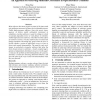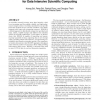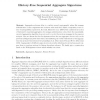90 search results - page 8 / 18 » Fault-Tolerant Aggregate Signatures |
IWSSD
2000
IEEE
14 years 3 months ago
2000
IEEE
Most software that most people use most of the time needs only moderate assurance of fitness for its intended purpose. Unlike high-assurance software, where the severe consequence...
HPDC
2010
IEEE
13 years 12 months ago
2010
IEEE
As scientific research becomes more data intensive, there is an increasing need for scalable, reliable, and high performance storage systems. Such data repositories must provide b...
OPODIS
2010
13 years 8 months ago
2010
Abstract. Wireless Ad-hoc networks are distributed systems that often reside in error-prone environments. Self-stabilization lets the system recover autonomously from an arbitrary ...
AINA
2006
IEEE
14 years 2 months ago
2006
IEEE
Ad hoc networks are dynamic networks formed "on the fly" by a set of nodes. Achieving secure routing in such networks is a big challenge. Asymmetric signature schemes pr...
IACR
2011
12 years 10 months ago
2011
Aggregation schemes allow to combine several cryptographic values like message authentication codes or signatures into a shorter value such that, despite compression, some notion o...



